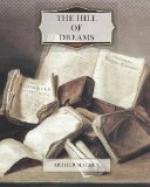He walked amongst these people, looked at their faces, and looked at the children amongst them. He had come out thinking that he would see the English working class, “the best-behaved and the best-tempered crowd in the world,” enjoying the simple pleasure of the Saturday night’s shopping. Mother bought the joint for Sunday’s dinner, and perhaps a pair of boots for father; father had an honest glass of beer, and the children were given bags of sweets, and then all these worthy people went decently home to their well-earned rest. De Quincey had enjoyed the sight in his day, and had studied the rise and fall of onions and potatoes. Lucian, indeed, had desired to take these simple emotions as an opiate, to forget the fine fret and fantastic trouble of his own existence in plain things and the palpable joy of rest after labor. He was only afraid lest he should be too sharply reproached by the sight of these men who fought bravely year after year against starvation, who knew nothing of intricate and imagined grief, but only the weariness of relentless labor, of the long battle for their wives and children. It would be pathetic, he thought, to see them content with so little, brightened by the expectation of a day’s rest and a good dinner, forced, even then, to reckon every penny, and to make their children laugh with halfpence. Either he would be ashamed before so much content, or else he would be again touched by the sense of his inhumanity which could take no interest in the common things of life. But still he went to be at least taken out of himself, to be forced to look at another side of the world, so that he might perhaps forget a little while his own sorrows.




